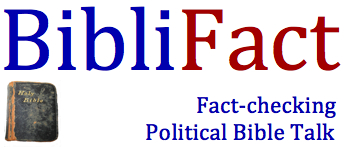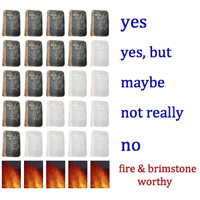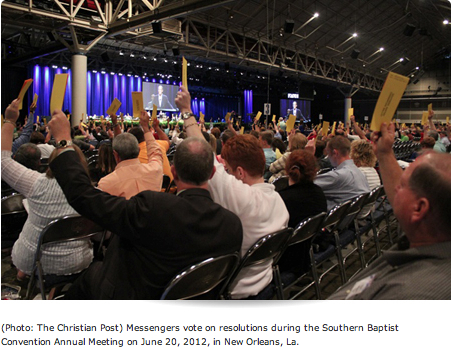
"They welcomed the message very eagerly
and examined the scriptures every day
to see whether these things were so"
--Acts 17:11
As we make our way toward the 2012 elections, many feel tossed to and fro by often contradicting claims about what the Bible says on this or that political issue. Most people just don't know the Bible well enough to say whether these claims are right, wrong, correct, incorrect or a matter of interpretation. How can we keep political Biblespeak honest? Inspired by PolitiFact.com, BibliFact roundups aim to do just that.

Southern Baptists And Pacquiao vs. Savage On Sex And Marriage
Unlike many of his supporters, Republican presidential hopeful Mitt Romney seems reluctant to engage in Bible talk. Indeed, one has to wonder if he's intentionally avoiding it. How else did he manage to deliver a 20-minute commencement address at Liberty University, a citadel of conservative evangelicalism founded by the late Jerry Falwell, without once quoting from Scripture, let alone referring or even alluding to it? No mean feat, and probably a first for a graduation ceremony there.
Of course, having a Mormon deliver the address was also a first for Liberty, and the booing from some students as Romney was introduced made clear that not everyone was happy about it. No doubt his avoidance of biblical references was an attempt to avoid fanning any flames among students, faculty and administrators who believed that the university had compromised its Christian identity and biblical values even by giving him the podium, which in that context looks a lot like a pulpit.
Like most politicians whose religious identity is outside the American Protestant mainstream, Romney tends to avoid all but the most general references to American civil religion -- family, prosperity, posterity, etc. To get more specific, especially with biblical citations, risks opening a potentially messy can of worms for him, namely, his alternative canon of Scriptures, which includes not only the Protestant Bible but also the Book of Mormon.
President Obama, too, has waxed less biblically of late. Despite the potential for support among evangelical progressives on immigration reform, as witnessed by the mobilizing work of Sojourners, the National Latino Evangelical Coalition, and many others, he made no references to the many biblical passages that call for hospitality to resident aliens in his address to the National Association of Latino Elected and Appointed Officials on June 22. And when he went public in May with his change of heart about gay marriage, he said he was motivated by his personal Christian faith, and he mentioned the Golden Rule ("do unto others") from Matthew 7:12 and Luke 6:31, but did not address any of the biblical arguments so often invoked concerning homosexuality and gay marriage.
But others are filling in, providing biblical prooftexts for and against Obama's and Romney's positions.
Southern Baptist Resolution

At the annual meeting of the Southern Baptist Convention in New Orleans, June 19-20, its "messengers" (delegates) passed a resolution, "On 'Same-Sex Marriage' and Civil Rights Rhetoric," which responds directly to "the first time in history the President of the United States has publicly voiced his personal support of 'same-sex marriage.'" That document opens with these four specific claims about what the Bible says on marriage, sexuality and human nature:
"WHEREAS, Marriage is a covenant relationship and an institution established by God rather than simply a human social construct (Genesis 2:24; Matthew 19:4-6; Ephesians 5:22-33); and
WHEREAS, Southern Baptists have consistently affirmed our support of the biblical definition of marriage as the exclusive union of one man and one woman; and
WHEREAS, The Scriptures indicate that all sexual behavior outside of marriage is sinful; and
WHEREAS, All people, regardless of race or sexual orientation, are created in the image of God and thus are due respect and love (Genesis 1:26-27)..."
--SBC Resolution "On 'Same-Sex Marriage' and Civil Rights Rhetoric," June 2012
 ... AND
... AND 
Notice that the first and fourth claims come with citations of specific biblical texts that are commonly interpreted to support these claims, especially among conservative Christians. The first, that marriage is a divinely established covenant relationship and not just some kind of sociological phenomenon is often grounded in God's creation of Eve and Adam as flesh of flesh and bone of bone: "therefore a man leaves his father and his mother and clings to his wife, and they become one flesh" (2:24). Not that this text actually mandates or institutes anything so much as it offers an explanation of why couples do what they do. In the second citation for this claim, Matthew 19:4-6, Jesus quotes this same passage from Genesis as support for his quite radical position on divorce, that there's no going back: "So they are no longer two, but one flesh. Therefore what God has joined together, let no one separate" (19:6). The third citation, Ephesians 5:22-33, is part of a collection of mandates, ostensibly from Paul to the church at Ephesus (many scholars argue that this letter is pseudonymous or "deutero-Pauline"), calling for wives to "submit" to their husbands even as the church submits to Christ, its head, and for husbands to "love" their wives as Christ loves his church.
The resolution backs its fourth claim, that all people are created in the image of God and therefore deserve respect and love, is backed by Genesis 1:26-27, from the first creation story, in which God creates humans, male and female, in God's own image -- a biblical claim that resonates powerfully for religious people of all kinds and stripes.
But sandwiched between these first and fourth biblical claims are two others that don't include specific citations: that "the biblical definition of marriage" is "the exclusive union of one man and one woman" and that "Scriptures indicate that all sexual behavior outside of marriage is sinful." The claim that the Bible defines marriage as "the exclusive union" of one man and one woman could find some general support from the texts cited earlier in support of marriage is a divine institution. But it is blatantly contradicted by many stories of divinely blessed unions of biblical patriarchs and kings to multiple wives, servants and concubines. Think of Jacob, renamed Israel, whose 15 children are born to his two wives, Rachel and Leah, and their two servants, Bilhah and Zilpah. And think of David, who has seven wives as well as an un-specified number of concubines (at least 10, with whom his son Absalom has sex on David's palace rooftop after driving David out of Jerusalem; 2 Samuel 16:22). Indeed, in biblical tradition, exclusive male-female unions are far from definitive.
Likewise the claim that "the Scriptures indicate that all sexual behavior outside of marriage is sinful." No, they don't, at least not in any consistent way. To be sure, there are several biblical texts, especially in the legal traditions of the Torah, that condemn adultery, that is, extra-marital sex, but they do so because it involves a man taking another man's wife. Which is also why David's taking of Bathsheba was condemned as sinful: not because he wasn't married to her but because she was married to someone else -- another man's property, as the prophet Nathan makes clear when he confronts David with God's judgment. Within that social system, adultery is a threat to patriarchy. Non-adulterous pre- or extra-marital sex is a different matter altogether. The Song of Songs, for example, is a collection of steamy erotic love poetry between two young people, and there is no indication that they are married. Abraham has sex with his wife Sarah's Egyptian slave-girl Hagar in order to produce an heir (Genesis 16:1-3). And of course there's the prostitute Rahab, heroine of the battle of Jericho and David's great-great-grandmother, who hosts the Israelite spies while they're casing the city (Joshua 2:1-3 and 6:17-25). And lest she be judged, how did the spies wind up staying with her in the first place? And so on. The fact is that there is no clear scriptural indication, let alone biblical definition, when it comes to sex within and without marriage.
Manny Pacquiao vs. Dan Savage on Gay Marriage

Still more dramatic biblical battles continue to wage over homosexuality and gay marriage. The two most provocative voices in this fight of late have been, in one corner, professional boxing champion and politician Manny Pacquiao, and, in that corner, author and founder of the It Gets Better Project, Dan Savage.
"God only expects man and woman to be together and to be legally married, only if they so are in love with each other ... It should not be of the same sex so as to adulterate the altar of matrimony, like in the days of Sodom and Gomorrah of Old." --"Interview: Pacquaio Rejects Obama's New Twist on the Scriptures"

Again, God's destruction of Sodom and Gomorrah in Genesis 18-19 is not on account of homosexuality, let alone same-sex marriage. In fact, it's not at all clear why they warrant fire and brimstone. God says to Abraham, "How great is the outcry against Sodom and Gomorrah and how very grave their sin! I must go down and see whether they have done altogether according to the outcry that has come to me; and if not, I will know" (Genesis 18:20-21). The word "outcry" (Hebrew ze'aqah), which God uses twice in this short declaration, is used elsewhere in the Bible to refer to the outcry of victims of injustice. In Exodus 2:23, for example, the oppressed Hebrew slaves in Egypt "cry out" (verb form of the same word) to God, which leads to their deliverance. So perhaps the sin of Sodom and Gomorrah is enslavement or a similar form of oppression. The idea that homosexuality is to blame comes from later in the story, when men from Sodom try to rape two men staying with Lot, who offers his daughters in their place. That episode makes clear how bad it can get for visitors and daughters in Sodom. But it's about rape, not homosexuality. And, as far as we know, none of the rapists are married couples or domestic partners.
"We can learn to ignore the bullshit in the Bible about gay people. [applause] The same way, the same way we have learned to ignore the bullshit in the Bible about shellfish, about slavery, about dinner, about farming, about menstruation, about virginity, about masturbation. [applause] We ignore bullshit in the Bible about all sorts of things. The Bible is a radically pro-slavery document. Slave owners waved Bibles over their heads during the Civil War and justified it. The shortest book in the New Testament is a letter from Paul to a Christian slave owner about owning his Christian slave. And Paul doesn't say "Christians don't own people." Paul talks about how Christians own people ... The Bible says that if your daughter's not a virgin on her wedding night -- if a woman isn't a virgin on her wedding night, she shall be dragged to her father's doorstep and stoned to death. Callista Gingrich lives. [applause] And there is no effort to amend state constitutions to make it legal to stone women to death on their wedding night if they're not virgins. At least not yet. We don't know where the GOP is going these days." --Dan Savage Discusses Bible at High School Journalism Convention
 Yes, Deuteronomy 22:20-21 says that if a man can prove that his new wife was not a virgin when he married her he can return her to her father's door where she will be stoned to death. And Savage is justified to compare this law to those in Leviticus (18:22 and 20:13) that prohibit a man from lying with another man "as he lies with a woman" under penalty of death. That prohibition appears along with several other prohibitions, including adultery, sex with a menstruating woman and sex with a former prostitute (like David's great-great-grandmother Rahab?).
Yes, Deuteronomy 22:20-21 says that if a man can prove that his new wife was not a virgin when he married her he can return her to her father's door where she will be stoned to death. And Savage is justified to compare this law to those in Leviticus (18:22 and 20:13) that prohibit a man from lying with another man "as he lies with a woman" under penalty of death. That prohibition appears along with several other prohibitions, including adultery, sex with a menstruating woman and sex with a former prostitute (like David's great-great-grandmother Rahab?).
And yes, there are many texts in the Bible that clearly presume slavery as a matter of fact, and even institutionalize it. The first 15 chapters of the book of Exodus tell the story of the Hebrew people's liberation from slavery in Egypt. Then, only six chapters later, without any apparent sense of irony, we find regulations for their own trade in and treatment of slaves. Indeed, you need look no further than the Tenth Commandment (Exodus 19:17), which prohibits one from coveting a neighbor's male or female slave (not to mention his wife, cattle, house and other property). That text, like many others in the Torah, takes slavery for granted. And we mentioned the slave-girls of Sarah, Rachel and Leah earlier. Finally, as Savage points out, Paul's brief letter to Philemon, a slave-owning Christian, does not criticize slavery per se. Instead Paul asks him to welcome the return of an escaped slave named Onesimus, with whom Paul has become close, "no longer as a slave but as more than a slave, a beloved brother" (Philemon 16). Calling these texts or the Bible as a whole "radically pro-slavery" is going too far, but much of biblical tradition does appear to accept slavery as a part of its social context.
And yes, those arguing for slavery did indeed wave these and other pro-slavery biblical texts at abolitionists, often from the pulpit. But the abolitionists had their sling full of anti-slavery biblical texts too. Indeed, most major liberation movements over the last century and a half, including not only abolitionism but also the women's rights and civil rights movements, have found inspiration in the Bible.
The problem in political discourse these days is that too many on the right and the left operate with simplistic assumptions about the Bible that just don't hold up when you read it thoughtfully. They assume that the Bible is a book, indeed The Book, of moral pronouncements about what's right and wrong, what to do and what to think. They assume it takes clear positions on controversial issues, that is says things about things. As though God sat down, wrote it out and published it to settle matters once and for all. When in fact the Bible doesn't say one thing, clearly, about anything that really matters. Mark Twain put it best when he described the Bible as a drugstore: in it you can find both poison and cure, depending on what, when and how you open it up and read it.
The Bible isn't a pro-slavery or anti-slavery document, nor is it a pro-gay or anti-gay document. It's not a document at all; it is, rather, a polyvocal library, a collection of different voices that often disagree with one another. As such it is not a document that takes positions but a locus of interpretation and argument.